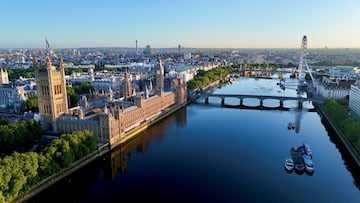POLITICS
What is the difference between the House of Lords and the House of Commons of the UK Parliament?
The sessions of the Upper House and the Lower House of the legislative system in the United Kingdom are held in the Palace of Westminster.

The British Parliament is the legislative body of the United Kingdom and is bicameral, that is, it has two chambers. These are named ‘houses’: the House of Lords, which is the upper chamber, and the House of Commons, the lower chamber. Both are crucial for the exercise of legislative power, though they differ in their composition, functions, and areas of authority.
The House of Lords includes appointed members who are life peers, bishops, and hereditary peers, whereas the House of Commons consists of Members of Parliament (MPs) who are elected by the public in their respective constituencies. Let’s delve a little deeper.

House of Lords
Officially named ‘The Right Honourable the Lords Spiritual and Temporal in Parliament Assembled,’ the House of Lords – casually referred to as just ‘the Lords’ – consists of 788 unelected members. Since 2021, it has been presided over by the ‘Lord Speaker’, John McFall, whose main role is to oversee the proceedings of the chamber and manage proposals from the House of Commons.
Members of the Lords are generally seen as distinguished intellectuals, people of prestige, or renowned business leaders who serve as advisors on complex matters within the UK. The Lords are categorised into two types, linking back to the official title: the Lords Spiritual and the Lords Temporal. The Lords Spiritual are bishops of the Church of England, while the Lords Temporal are either hereditary peers or life peers appointed by the Queen.
The Lords is responsible for reviewing legislation and participates in debates that scrutinise government actions. It does have certain limitations, for instance, it cannot permanently veto legislation or definitively reject proposals from the Commons. Additionally, it has no power over fiscal matters. However, since 2009, the Lords has been responsible for judicial functions, following the establishment of the Supreme Court which took over the judicial roles previously held by the Lords.
House of Commons
The official name of the House of Commons is “The Honourable the Commons of the United Kingdom of Great Britain and Northern Ireland in Parliament Assembled.” Unlike the House of Lords, it consists of 650 members who are democratically elected. The person that leads the Commons is known as the ‘Speaker of the House,’ a role currently held by Lindsay Hoyle.
While the House of Lords also proposes legislation, the House of Commons is the principal body responsible for initiating, approving, and formulating laws, particularly the more contentious ones. It’s where the Prime Minister and Leader of the Opposition are often seen going head to head in debates.
It is there to represent the citizens of the United Kingdom and, unlike the Lords, has powers over fiscal and budgetary matters. Generally, the House of Commons is considered more powerful than the House of Lords, holding the final say in legislative matters, including the authority to override decisions made by the Lords.






